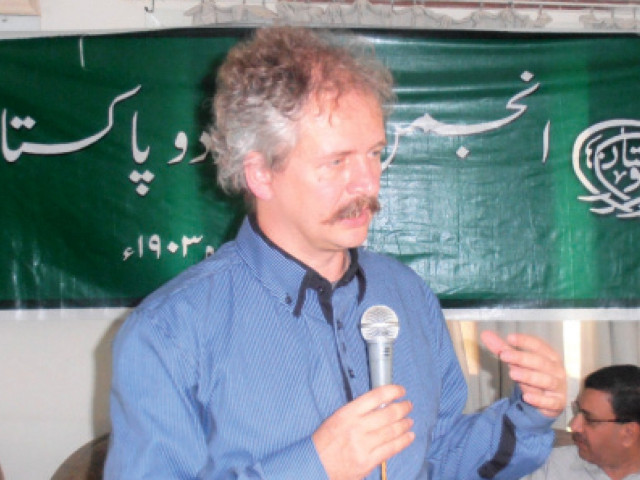‘Pakistan could become an example for tolerance between different linguistic groups’
German scholar Dr Wessler says dialogues are the best way to resolve conflicts.

Though India has been creating new provinces on the basis of language, Dr Heinz Werner Wessler, a German scholar of Urdu, believes that it should not be used to draw up boundaries between people.
On Saturday, Dr Wessler, a visiting professor at Uppsala University in Sweden, dug into his life experiences and shared his thoughts about Eastern languages at Anjuman Taraqqi-e-Urdu Pakistan’s office. The professor, who is called ‘Mr South Asia’ by his peers and students because of his knowledge about the region, is on a short visit to Pakistan. “It would not be wise to make a new province on the basis of a language,” said Dr Wessler, adding that different linguistic groups can help add diversity to monocultural societies.
He added that dialogues between different linguistic groups could help stem conflicts. If it tries, Pakistan could serve as a model for countries facing problems because of spats between different linguistic groups, said Dr Wessler. He asserted that societies were changing because people are eager to learn new languages such as Sanskrit, Urdu and Hindi. “They derive motivation from their interest in knowing more about the world which is different from their own.”
He said more people were enrolling in linguistic departments in different universities and many of them even visit other countries to enhance their communication skills once they have sufficient command over the language.
He then shared his experience about Germany and other parts of the world where people - especially young ones - sing Bollywood songs in Urdu or Hindi without even understanding the meaning. “Had you asked me 15 years ago if Bollywood movies could gain popularity in European countries, I’d have denied it straight away,” said Dr Wessler. But things have changed. He said that Bollywood movies are now shown in cinemas in Europe on the weekends and people can also watch them on TV every Thursday night.
For Dr Wessler, learning a new language is no easy matter as this is tantamount to becoming a bridge between two societies. “One must be conscious enough why it is important to learn a particular language,” he said, adding that he himself transformed while he was writing a thesis on Dalits of India. “My way of thinking was changed during the time I had spent with the intellectuals and commoners of the community.” Earlier, the honourary secretary of the Anjuman, Azfar Rizvi, and renowned researcher and critic Dr Rauf Parekh spoke on the occasion.
Same language, different script?
Dr Wessler said that both Urdu and Hindi are essentially the same languages but have two scripts to remain distinct from one another. Likewise, Croatian and Serbian languages, which are almost similar to each other, have different scripts because of long-lasting differences between the Serbs and Croats.
“Before Partition, Urdu had this status of lingua franca among Hindu, Muslim and Sikh intellectuals and writers of the subcontinent,” said Dr Wessler. He cited examples of several writers, including Munshi Prem Chand and Rajinder Singh Bedi, to drive this point home. Similarly, Muslims too have made great literary contributions in Hindi.
Published in The Express Tribune, November 11th, 2012.



















COMMENTS
Comments are moderated and generally will be posted if they are on-topic and not abusive.
For more information, please see our Comments FAQ